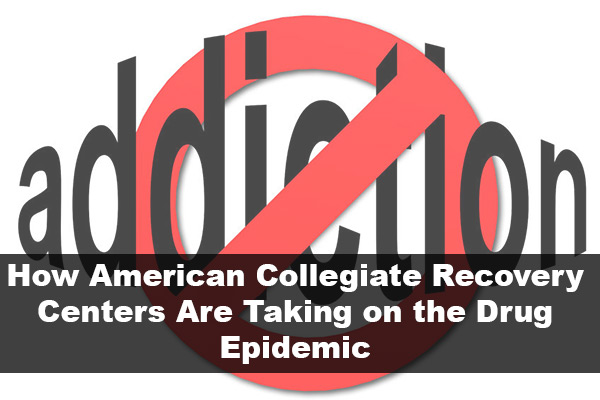How American Collegiate Recovery Centers Are Taking On The Drug Epidemic
When you think of college life, you probably think about flip cup and frat parties. We often think of drinking and partying in college as a right of passage. But have you ever stopped to think about what the college experience is like for someone in recovery? American colleges aren’t exactly known for their sober support systems.
To be fair, it’s not like the college faculty is out there promoting drugs and alcohol. Most students are aware that these things are frowned upon. But until recently, that’s about where a college’s involvement ended. Colleges didn’t promote partying, but they often turned a blind eye to addiction and recovery.
tang90246 © 123RF.com
What are opioids?
Opioids are a class of drug typically used to relieve pain. They are highly effective painkillers, but they also produce a “high” feeling and are extremely addictive. Opioids include prescription drugs like codeine, Oxycontin, Vicodin and the synthetic drug fentanyl. Heroin is also an opioid drug, but this street drug isn’t typically given by prescription.
Opioids are most dangerous because of their addictive properties, but they have other dangerous side effects too. Opioids slow a person’s respiration and can halt breathing altogether during an overdose, especially if they’re taken with alcohol.
Opioids get the spotlight because they are the driving force behind this country’s drug epidemic, but they aren’t the only drug college students are abusing. Alcohol, marijuana and prescription amphetamines top out the list of commonly abused drugs by college students. Amphetamines include study drugs like Adderall and Ritalin.
How the opioid epidemic changed the landscape
The current opioid epidemic is far-reaching, and it affects people of all ages. According to the National Institute on Drug Abuse, opioids alone have taken more than 30,000 lives between 2002 and 2005, and that number is growing. Many addictions start with prescription painkillers, but you might be surprised to learn that you don’t always need a prescription to get your hands on some pain pills.
In 2015, researchers at the Hazelden Betty Ford Institute surveyed 1,200 college-aged Americans an found that nearly 16 percent had used opioid painkillers without a prescription. That equates to four people out of every 25. And somewhat alarmingly, 37 percent of respondents also said they wouldn’t know where to go for help during an overdose.
It’s important to note that not all college students who have used opioids are addicted. Some college-aged students will experiment with opioids without ever getting addicted. But we do know that addiction is a problem in this age group.
It’s difficult to collect data on college addiction because students tend to drop out without offering a reason when they become addicted. But for the past 10 years, people under 25 have accounted for up to 12 percent of all fatal overdoses.
How collegiate recovery centers are taking on the drug epidemic
The current drug epidemic makes it difficult to turn a blind eye to college drug abuse, and many colleges are stepping up with recovery programs.
Collegiate Recovery Programs (CRPs) provide resources, fellowship, housing and community to students who are in recovery. The aim of these programs is to help support recovery and give every student a chance to succeed in school and life.
In 2013, there were about two dozen collegiate recovery programs. According to nonprofit Transforming Youth Recovery, there are 186 CRPs in the United States. In some colleges, it’s even possible for students to receive medication-assisted treatment to help wean them off of opioids.
In 2016, the American College Health Association issued new guidelines for opioid prescriptions in response to the opioid epidemic. The goal of this program is to reduce the number of opioid prescriptions that land in the hands of college students.
Tips on staying sober in college
Whether you’re recovering from an addiction or would just prefer studying over partying, there are ways to get through college sober.
If you are a recovering addict or alcoholic, reach out to your school’s collegiate recovery program for help. Here, you may also find peer support to help you navigate social situations.
The following tips may help anyone who wants to stay sober in college:
• Find friends with similar interests – You’ll quickly learn who is at school to work and who is there to party. Surround yourself with the people who don’t plan their lives around the next party.
• Adopt a healthy hobby – Do something you enjoy that will also keep you busy. Whether it’s a school activity or knitting, find your passion and work on getting good at it.
• Appreciate alone time – There may be times when your friends are all at a party and you’re sitting in your room alone. That almost sounds sad until you think of all the ways you can enjoy time to yourself. Use the quiet time to study, call home or just relax.
With the help of collegiate recovery centers and peer supports, it’s possible to stay sober and thrive while in college. Rely on every support available to you, and you’ll do just fine.
Author’s Bio: Tim Stoddart is the co-founder and current president of Sober Nation. Tim is a big believer in the power of thought, positive living, health, and kindness. A recovering addict and admitted adrenaline junky, Tim has found new and healthier ways to fill the void. He gives credit for his “spiritual awakening” to his loving family and reading thought-provoking books.



